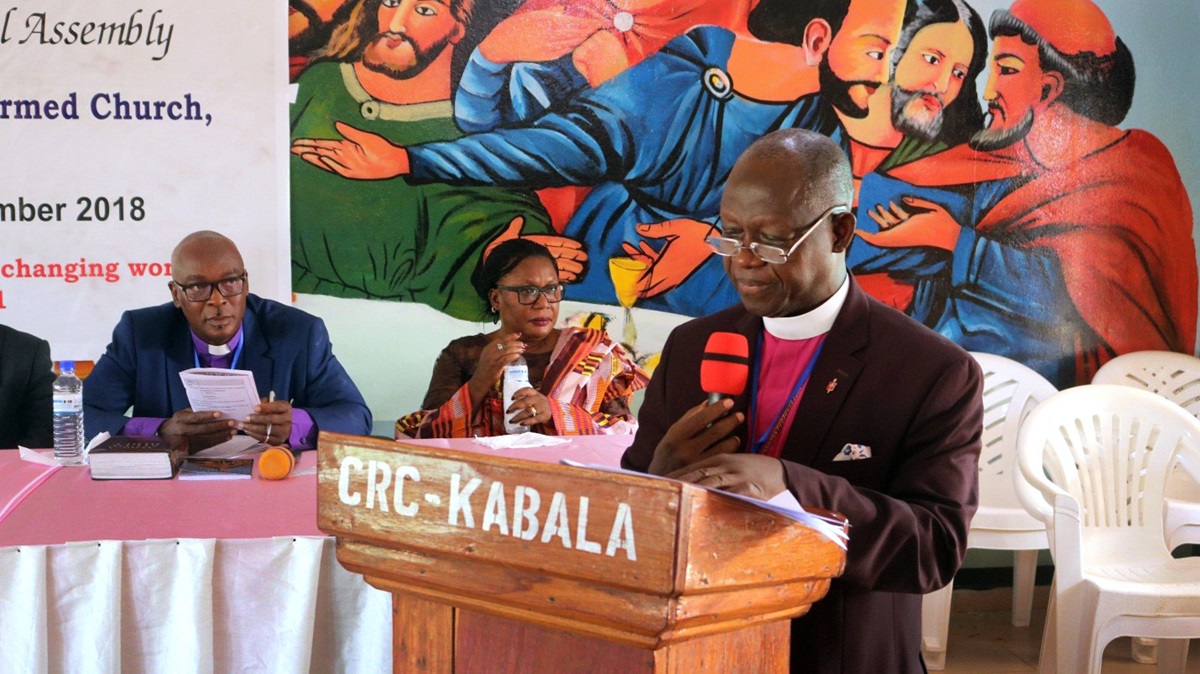Nanah Kamara, a lay pastor of the Emmanuel Baptist Conference in Sierra Leone, regrets having allowed herself and family to undergo the painful surgery of circumcision, otherwise known as female genital mutilation. She said her eyes are now opened to the real dangers and she is mobilizing other women to reject the practice.
Kamara spoke at an event launching a Council of Churches ecumenical conversation among faith leaders to end female genital mutilation in Sierra Leone.
Church leaders say ignorance about the practice has kept the church from speaking with one voice and that enlightenment will inspire commitment to act.
United Methodist Bishop John K. Yambasu, council president, emphasized that the church has a moral responsibility to teach and preach the Gospel to liberate people from burdens that have weighed on them for many years.
The church’s position is clear: Female genital mutilation is a harmful traditional practice, he said. He added that the church has engaged in research and dialogue with stakeholders in cities, towns and rural communities to minimize the practice.
Female genital mutilation — using razor blades and knives to remove all or part of the female external genitalia — is practiced through a secret female society known as “bondo.”
According to the World Health Organization, an estimated 100 million to 140 million girls and women worldwide have undergone the procedure as a traditional initiation ritual or marriage-preparation custom, and every year, 2 million girls are at risk of being subjected to the practice.
Female genital mutilation is usually performed by “sowees,” traditional leaders who are professional circumcisers.
“The church should keep in mind that the key stakeholders have reasons for supporting and sustaining the practice,” Yambasu said. “It is no secret that FGM (female genital mutilation) offers job opportunities and benefits for paramount chiefs (traditional leaders) and initiators (sowees). The church should consider very seriously the question of what we do if we take the knife from the initiators. Do we give them bread in the place of the knife? Do we give them other livelihood skills? These are critical questions we should ask ourselves.”
Kamara champions the anti-genital mutilation campaign in Bumbuna in Tonkolili District of northern Sierra Leone. She recently saved two girls from being initiated during the school holidays. Her intervention is building confidence among girls to refuse female genital mutilation, knowing they have a safe place to go when forced or intimidated to undergo the procedure. “On two occasions,” Kamara recalled, “girls ran into my home to escape being mutilated. It was a hot battle between the cutters, the parents and myself. They fought back at me, threatening a traditional curse on me for disrupting, but after a series of education and negotiations,” one of the parents credited Kamara with intervening before the other girls would have been allowed to be mutilated.
A teenager from the United Methodist Young Women’s Network in Kono District of eastern Sierra Leone shared her experience of female genital mutilation as the only surviving child of her family.
“I was pressured on the basis of culture,” she said. “It caused me severe pain and bleeding. The scar is still fresh in my mind.”
She urged eliminating the practice since it adds no value to a woman’s life, contrary to the view held by many in her community.
“As an anti-female genital mutilation campaigner,” she continued, “I will educate my peers in my community; it is not biblical.”
While no law criminalizes the practice in Sierra Leone, a policy does exist that restricts the mutilation of girls younger than 18 years.
Bread for the World, a global donor agency has partnered with the Sierra Leone Council of Churches to promote an alternative rite of passage that seeks to provide girls with life-skills training and knowledge about teenage pregnancy, early marriage and sexual and reproductive health issues.
Girls Protection Clubs, established in various communities, serve about a million young women. The Council of Churches works with more than 60 church leaders in 11 districts where the clubs are part of the community-education campaign to minimize female genital mutilation.
The Rev. Moses Khanu is the national project coordinator for the campaign Community Education to Minimize the Practice of FGM in Sierra Leone. He said the group is using biblical law and teachings to educate communities on the dangers of FGM. They also caution about socioeconomic effects of the practice, including health consequences, early marriage, teenage pregnancy, gender inequity and an increase in girls’ school dropout rates.
More than 200 faith leaders recently signed an open letter of commitment that included acknowledgement that the practice of female genital mutilation is harmful “and, therefore, (I am) willing to join the fight as a religious leader to put an end to it in Sierra Leone.” The signing process continues in other regions of the country.
Kargbo is the director of Church and Society for the Sierra Leone Conference.
News media contact: Vicki Brown, news editor, [email protected] or 615-742-5469. To read more United Methodist news, subscribe to the free Daily or Weekly Digests.
Like what you're reading? Support the ministry of UM News! Your support ensures the latest denominational news, dynamic stories and informative articles will continue to connect our global community. Make a tax-deductible donation at ResourceUMC.org/GiveUMCom.




